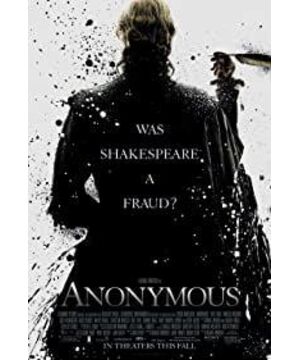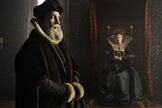gimmick can be said to shock the world, but creative attitude It is also rigorous and meticulous. Not only has it achieved a seamless connection with the official history, all allusions have been hand-picked and turned into the main line of shocking blood without a trace. This film can be called an example of the high-end gameplay of the wild history. On a whim, I will summarize the historical facts that appeared in the play, and welcome to add:
1. Edward de Ville, Earl of Oxford
, was born in 1550, Elizabeth I was born in 1533, and the end of the film is borrowed from Robert Cecil. Kou reveals that he is indeed the illegitimate child left behind when the queen was 16 years old, which is indeed consistent with the age difference between the two. After the death of his father, Edward de Ville was sent to Cecil House as the ward of the queen to receive education, and later married the daughter of William Cecil. In the film, it is set as William Cecil who knows his life experience. Sear deliberately laid out his royal lineage to his descendants. In the film, the queen avoids seeing Edward de Ville's illegitimate child due to reputation concerns. The latter seduce her waitress in order to avenge the queen's infatuation, so she was briefly imprisoned and fell out of favor and expelled. It's true that she went out of the court. The tempted waitress was named Anne Vavasour, but Edward de Ville was motivated by the play of the screenwriter.
Edward de Ville is quite famous. As a poet, playwright, and a generous funder of literary drama, the theory that he is the actual author of Shakespeare’s works appeared as early as the 19th century, initially as a group of authors One of the members was mentioned, and was later referred to by some scholars as the sole author of Shakespeare’s plays. In this regard, the film's choice of him as the protagonist is also a matter of course.
2. Ben Jonson
Ben Jonson plays the role of clue and witness in the film. In fact, he is also a contemporary poet and playwright with Shakespeare, and is known for his expertise in comedy. In the first half of the film, he was imprisoned for satirizing the rich and powerful in his comedy. Fortunately, he was released from the asylum of Edward de Ville, which led to the protagonist of the film. This comedy is exactly one of his masterpieces "Everyone has a hobby." (Every Man in His Humour), Shakespeare’s first appearance in the film as one of the actors of this play also accords with historical facts.
3.
Since Shakespeare's script is based on the theory that Edward de Ville is the true author of Shakespeare's plays, Shakespeare has no choice but to act as a shameless harlequin. In the film, he threatened to extort money from Edward de Ville by revealing the true identity of the playwright, claiming to use the money to build his own theater, which is the famous Globe Theater. As in the movie, the theater was burned down, but this happened in 1613, rather than around 1604 when Edward de Ville died as shown in the movie. Another interesting plot is that because of his dissatisfaction with Shakespeare's villain, Ben Jonson asked him to write and write in public, knowing that this would expose the fact that Shakespeare was illiterate. One of the arguments for questioning the identity of Shakespeare’s authorship is that Shakespeare’s low birth rate, inaccessible education, and ugly handwriting.
4. Christopher Marlowe,
another contemporary poet and playwright of Shakespeare, has a competitive relationship with Shakespeare. He also played a disgraceful role in the play, and reported to the authorities that Polonius was stabbed in Shakespeare’s play Hamlet. It alluded to the expectation of William Cecil’s death, and guessed that the Shakespeare author had something else. He used this to blackmail Shakespeare and was later found dead on the street. The play suggests that Shakespeare may have killed him. According to historical facts, Marlowe was assassinated and died unexpectedly, but the motives of the murderer are different.
5. Earl of Essex
The Earl of Essex was the main favored subject in the late reign of Elizabeth I. He is usually considered to be the queen’s lover. In the film, the love between the queen and Edward de Ville was chosen to highlight the love of Essex. Si is also set up as the queen's illegitimate child to explain the favor he has received. The film mentions the incident in which he and the Earl of Southampton travel to Ireland to counter the rebellion. Shakespeare’s "Henry V" is the allusion to Henry V’s battle against the French army to praise his achievements in fighting the Irish rebels. There were performances, and the scene in which he trespassed into the queen's palace after returning to England and looked at each other with the queen without a wig, no powder, and only a dressing gown was also true. As in the film, during Essex’s rebellion, his party members went to the Globe Theatre and asked to stage a Shakespeare show to create momentum for it, but this play was not called the hunchbacked title in the film, the protagonist referred to the same hunchback Robert. Cecil's "Richard III" is the "Richard II" describing the monarch being deposed because of mediocrity. The object of its metaphor is obviously Elizabeth herself.
6. "Venus and Adonis", "Sonnets",
Edward de Ville in the film of the Earl of Southampton, in order to win the Queen's approval of him and the political views of the Essex faction, wrote poems to the Queen to evoke The queen's memories of their past love affair, this poem is "Venus and Adonis". The theme of the poem is the courtship of the goddess Venus to the beautiful young Adonis. Compared with Adonis, Venus is naturally portrayed as an older and stronger female image. The film uses this as the relationship between the queen and Edward de Ville The portrayal of it makes sense. In fact, this poem was dedicated to the Earl of Southampton. Interestingly, there is also widespread speculation that Shakespeare’s other poem with a strong homosexuality, "Sonnet", is also dedicated to him-this poem The inscription is dedicated to a certain Mr. WH. It is the reverse of Henry Wriothesley, the Earl of Southampton. In the film, the Earl of Southampton is set as the protagonist’s illegitimate son. At the end of the film, when Edward de Ville entrusted the collection to Ben Jonson, he also included a short letter to Southampton saying "Everything I do is For you", it is reminiscent of the inscription in the "Sonnet", but it seems that the same-sex complex in this poem has become a father-son relationship. Southampton was involved in the Essex rebellion, was sentenced to death and changed to life imprisonment, and was released after James I succeeded to the throne. In the film, it was changed to be released by Edward de Ville interceding with the Queen.
7, all beings
Although not much ink, the film is a very realistic restoration of theater art, tennis sports, aristocratic education, and downtown landscapes at the turn of the sixteenth and seventeenth centuries, as well as Elizabeth, Cecil and his son, Essex, Southampton, The appearance of the characters like James I and their portraits is also one of the highlights.
View more about Anonymous reviews










